#i could write an essay about this book
Text



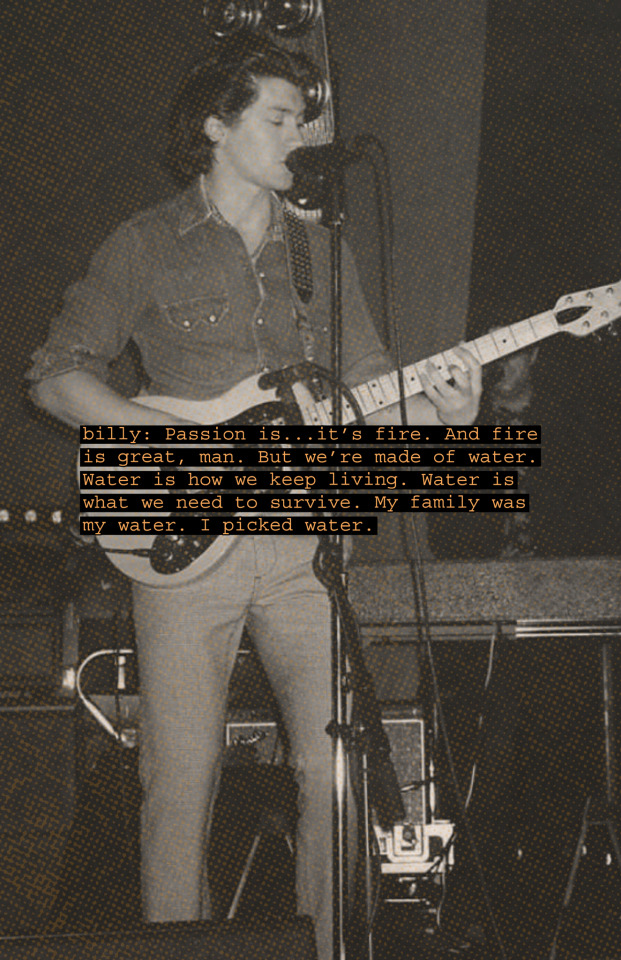
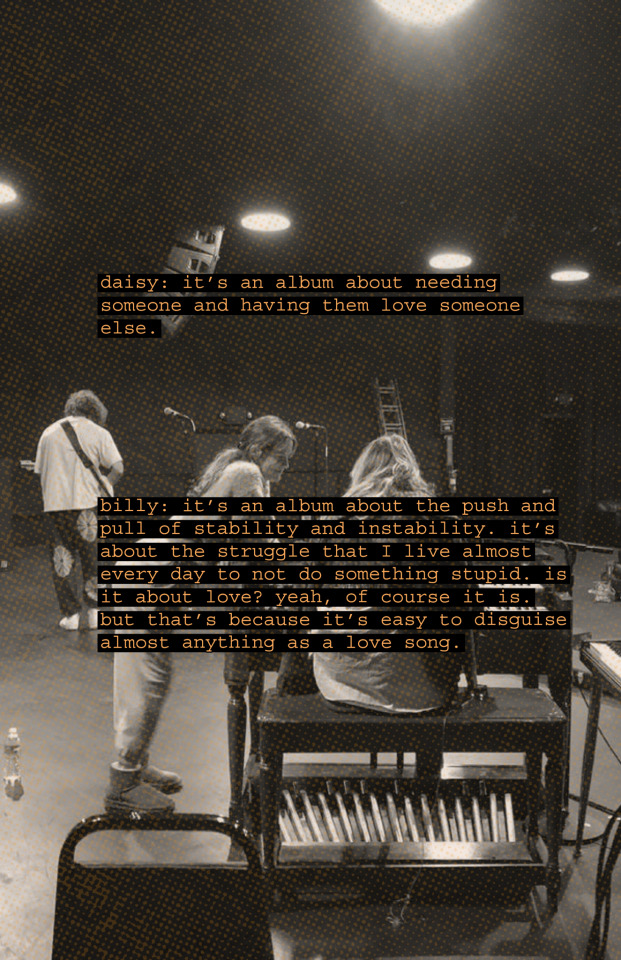

It’s like some of us are chasing after our nightmares the way other people chase dreams.
#djats#djatsedit#taylor jenkins reid#tjredit#litedit#storyseekers#booksociety#usercossette#userbie#usermansi#**#i could write an essay about this book#the character growth in this is everything#hope this does the book justice i tried
382 notes
·
View notes
Text
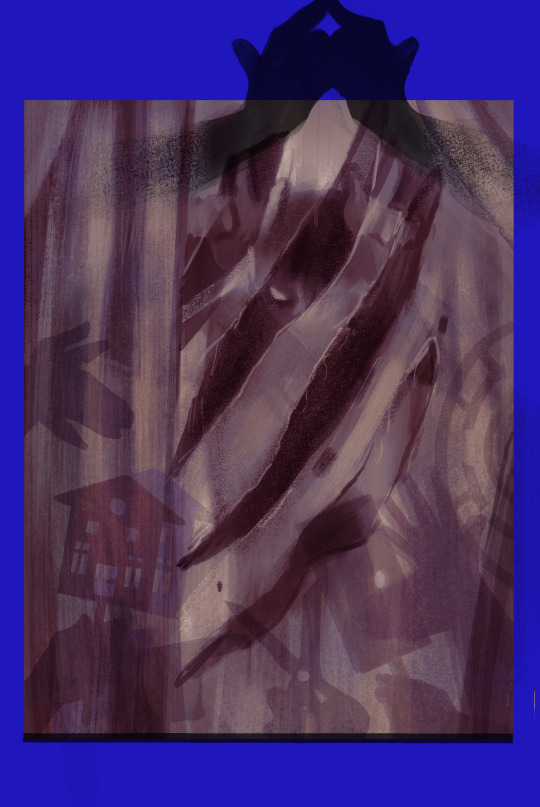
This is not for you.
#ever read a book that leaves (pun not intended) you staring at a wall for a while after finishing?#yeah. house of leaves good#confusing! but good!#never been that unnerved by typesetting before.#house of leaves#books#painting#digital#sfw#artists on tumblr#anyway i feel like i could write a whole zampano style essay about shadow puppetry and how it connects to the themes of the book#but i wont. To keep in the spirit of the book. and because im tired#oh i will point out (in case it isnt clear)#that the uppermost shadow is the hand sign for the american “here is the church this is the steeple” rhyme#and this sign goes with “open the doors and see all the people”#make of that what you will.#hmmmm btw i have been thinking of making a redbubble#mayhaps this could work for it!
1K notes
·
View notes
Text
I will never stop talking about how reading A Little Princess as an adult radically awakened a part of me that I thought was long dead; the unapologetic ability to play pretend and to romanticize the smallest things in my life.
It makes the most menial and boring everyday tasks into something worth doing, and frankly? It helps a lot with the executive dysfunction.
Cooking? I am a hobbit preparing a feast!
Cleaning the house? I live in a fairy cottage and I'm doing a huge spring cleaning!
Getting groceries? I am a villager getting ingredients for tonights dinner at the local marketplace!
There's always a scenario you can imagine to make things more interesting, less mundane. And thanks to rereading one of my childhood comfort books I have yet again discovered just how great the power of imagination really is, even for adults.
#talking about stuff#book talk#booklr#not me writing this while waiting at the doctor's lmao#but I stand by every word#ngl i could probably write a longer think piece on how important it is to never stop playing pretend#also could write an essay on how fuckin autistic sarah crewe is lmao
122 notes
·
View notes
Text
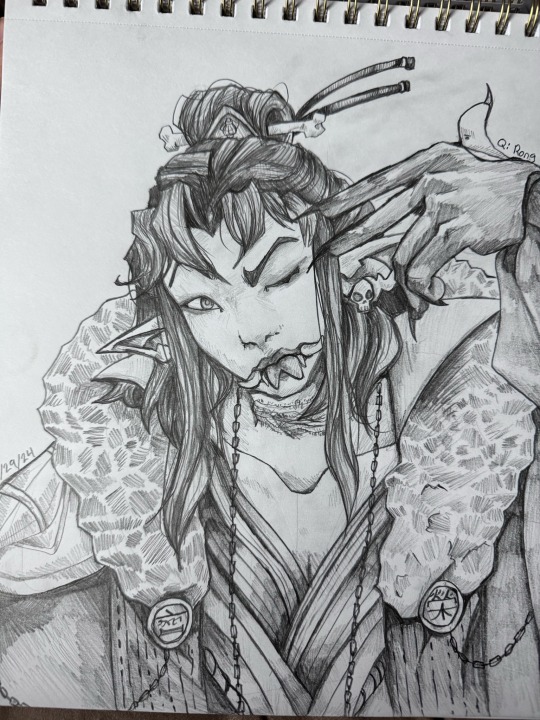
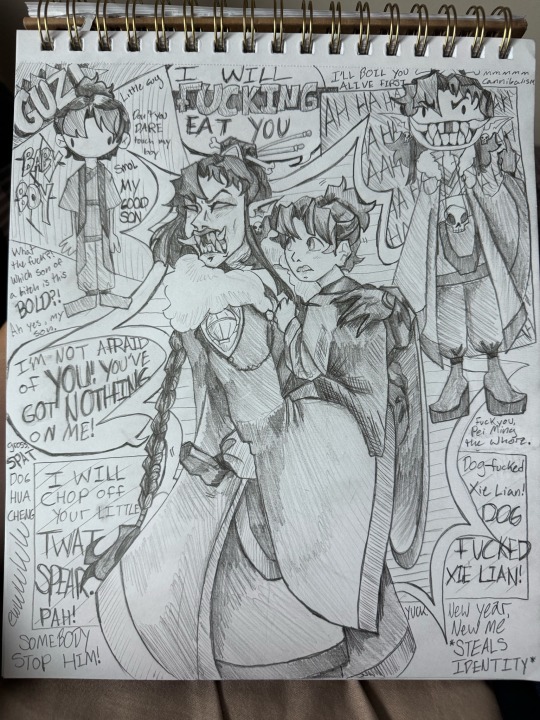
If you can’t tell I am entirely obsessed with this guy
#qi rong and guzi#qi rong#qi rong fanart#qi rong design#tgcf#tgcf qi rong#heaven officials blessing#heaven officials blessing season two#tgcf season two#tian guan ci fu#LITERALLT LOOK AT HIM PLS#Idk what to call his dynamic with Guzi cause he’s not fatherly at all but at the same time he’s guzis father#he really is my favorite character#go ahead and ask me why if you dare I will write you AN ENTIRE ESSAY about it#if I was more insane than I unfortunately am I would deadass write tgcf from his perspective just for fun#AND I WOULD IF I DIDNT HAVE SO MANY PROJECTS IN THE WAY#college is dumb and I’ve got books to sell before I can even attempt fanfiction again#BUT I TOTALLY WOULD#maybe I could#like as a string of oneshots ya know#like the flower crown prince ceremony but qi rong’s perspective like “the AUDACITY of that HOMELESS ASS LOOKING CHILD to FALL FROM A BRIDGE#‘THE FUCK IS HIS PROBLEM?!’#like really dude I have so many things to go running with#anyways#if you dare you could ask me to talk about him and I would just go off#love qi rong#qi rong appreciation
87 notes
·
View notes
Text

I typed up the Pentiment bibliography for my own use and thought I’d share it here too. In case anyone else is fixated enough on this game to embark on some light extra-curricular reading
I haven’t searched for every one of these books but a fair few can be found via one of the following: JSTOR / archive.org / pdfdrive.com / libgen + libgen.rocks; or respective websites for the journal articles.
List below the cut!
Beach, Alison I, Women as Scribes: Book Production and Monastic Reform in Twelfth-Century Bavaria. Cambridge University Press, 2004
Berger, Jutta Maria. Die Geschichte der Gastfreundschaft im hochmittelalterlichen Mönchtum die Cistercienser. Akademie Verlag GmbH, 1999
Blickle, Peter. The Revolution of 1525. Translated by Thomas A. Brady, Jr. and H.C. Erik Midelfort. The Johns Hopkins University Press, 1985
Brady, Thomas A., Jr. “Imperial Destinies: A New Biography of the Emperor Maximilian I.” The Journal of Modern History, vol.62, no.2, 1990. pp. 298-314
Brandl, Rainer. “Art or Craft? Art and the Artist in Medieval Nuremberg.” Gothic and Renaissance Art in Nuremberg 1300-2550. The Metropolitan Museum of Art, 1986
Byars, Jana L., “Prostitutes and Prostitution in Late Medieval Barcelona.” Masters Theses. Western Michigan University, 1997
Cashion, Debra Taylor. “The Art of Nikolaus Glockendon: Imitation and Originality in the Art of Renaissance Germany.” Journal of Historians of Netherlandish Art, vol.2, no.1-2, 2010
de Hamel, Christopher. A History of Illuminated Manuscripts. Phaidon Press Limited, 1986
Eco, Umberto. The Name of the Rose. Translated by William Weaver. Mariner Books, 2014
Eco, Umberto. Baudolino. Translated by William Weave. Boston, Mariner Books, 2003
Fournier, Jacques. “The Inquisition Records of Jacques Fournier.” Translated by Nancy P. Stork, San Jose University, 2020
Geary, Patrick. “Humiliation of Saints.” In Saints and their cults: studies in religious sociology, folklore, and history. Edited by Stephen Wilson. Cambridge University Press, 1985. pp. 123-140
Harrington, Joel F. The Faithful Executioner: Life and Death, Honor and Shame in the Turbulent Sixteenth Century. Farrar, Straus and Giroux, 2013
Hertzka, Gottfied and Wighard Strehlow. Große Hildegard-Apotheke. Christiana-Verlag, 2017
Hildegard von Bingen. Physica. Edited by Reiner Hildebrandt and Thomas Gloning. De Gruyter, 2010
Julian of Norwich. Revelations of Divine Love. Translated by Barry Windeatt. Oxford University Press, 2015
Karras, Ruth Mazo. Sexuality in Medieval Europe: Doing Unto Others. Routledge, 2017
Kerr, Julie. Monastic Hospitality: The Benedictines in England, c.1070-c.1250. Boydell Press, 2007
Kieckhefer, Richard. Forbidden rites: a necromancer's manual of the fifteenth century. Sutton, 1997
Kümin, Beat and B. Ann Tlusty. The World of the Tavern: Public Houses in Early Modern Europe. Routledge, 2017
Ilner, Thomas, et al. The Economy of Dürnberg-Bei-Hallein: an Iron Age Salt-mining Centre in the Austrian Alps. The Antiquaries Journal, vol. 83, 2003. pp. 123-194
Làng, Benedek. Unlocked Books: Manuscripts of Learned Magic in the Medieval Libraries of Central Europe. The Pennsylvania State University Press, 2008
Lindeman, Mary. Medicine and Society in Early Modern Europe. Cambridge University Press, 2010
Lowe, Kate. “'Representing' Africa: Ambassadors and Princes from Christian Africa to Renaissance Italy and Portugal, 1402-1608.” Transactions of the Royal Historical Society Sixth Series, vol. 17, pp. 101-128
Meyers, David. “Ritual, Confession, and Religion in Sixteenth-Century Germany.” Archiv für Reformationsgeschichte, vol. 89, 1998. pp. 125-143
Murat, Zuleika. “Wall paintings through the ages: the medieval period (Italy, twelfth to fifteenth century).” Archaeological and Anthropological Sciences, vol. 12, no. 191. Springer, October 2021. pp. 1-27
Overty, Joanne Filippone. “The Cost of Doing Scribal Business: Prices of Manuscript Books in England, 1300-1483.” Book History 11, 2008. pp. 1-32
Page, Sophie. Magic in the Cloister: Pious Motives, Illicit Interests and Occult Approaches to the Medieval Universe. The Pennsylvania State University Press, 2013
Park, Katharine. “The Criminal and the Saintly Body: Autopsy and Dissection in Renaissance Italy.” Renaissance Quarterly, vol. 47, no. 1, Spring 1994. pp. 1-33
Rebel, Hermann. Peasant Classes: The Bureaucratization of Property and Family Relations under Early Habsburg Absolutism, 1511-1636. Princeton University Press, 1983
Rublack, Ulinka. “Pregnancy, Childbirth, and the Female Body in Early Modern Germany.” Past & Present, vol. 150, no. 1, February 1996. pp. 84-110
Salvadore, Matteo. “The Ethiopian Age of Exploration: Prester John's Discovery of Europe, 1306-1458.” Journal of World History, vol. 21, no. 4, 2011. pp. 593 - 627
Sangster, Alan. “The Earliest Known Treatise on Double Entry Bookkeeping by Marino de Raphaeli”. The Accounting Historians Journal, vol. 42, no. 2, 2015. pp. 1-33.
Throop, Priscilla. Hildegard von Bingen's Physica: The Complete English Translation of Her Classic Work on Health and Healing. Healing Arts Press, 1998
Usher, Abbott Payson. “The Origins of Banking: The Primitive Bank of Deposit, 1200-1600.” The Economic History Review, vol. 4, no. 4, 1934. pp. 399-428
Waldman, Louis A. “Commissioning Art in Florence for Matthias Corvinus: The Painter and Agent Alexander Formoser and his Sons, Jacopo and Raffaello del Tedesco.” Italy and Hungary: Humanism and Art in the Early Renaissance. Edited by Péter Farbaky and Louis A. Waldman, Villa I Tatti, 2011. pp. 427-501
Wendt, Ulrich. Kultur und Jagd: ein Birschgang durch die Geschichte. G. Reimer, 1907
Whelan, Mark. “Taxes, Wagenburgs and a Nightingale: The Imperial Abbey of Ellwangen and the Hussite Wars, 1427-1435.” The Journal of Ecclesiastical History, vol. 72, no. 4, 2021, pp. 751-777.e
Wiesner-Hanks, Merry E. Women and Gender in Early Modern Europe. Cambridge University Press, 2008
Yardeni, Ada. The Book of Hebrew Script: History, Paleography, Script Styles, Calligraphy & Design. Tyndale House Publishers, 2010
#pentiment#Pentiment bibliography#some of these books give me strong first-year undergrad vibes#even just seeing ulinka rublack’s name gives me semi-traumatic flashbacks to cultural history seminars#would I cope better with it now that I don’t have to write essays each week on the topic?#¯\_ (ツ)_/¯#probs not tbh#also it probably would have been a lot faster if I could have pulled this list from game files somehow#but I do not know how to do that :)))#Anyway I hope this is of use to somebody at some point#I wish you all a very happy reading about the primitive deposit banking system everybody 😌
762 notes
·
View notes
Text
wilder girls 🤝 hell followed with us
extremely angry extremely gorey post-apocalyptic books about fucked-up queer teens trying to survive as they slowly turn into monsters against their will while still being so painfully human
#i could write an essay about the similarities between these books#wilder girls#hell followed with us#hfwu#I LOVE THESE BOOKS#they both permanently altered my brain#if you read and liked one of them you will definitely like the other#will probably rb this immediately to go into more detail#sorry everyone i’m hfwu posting again
220 notes
·
View notes
Text
i need to post loic soulsov character analysis because if i don't i'll die. he's been plaguing my thoughts for *checks watch* like three to four days because we get SO much information about him and who he is in just this one nugget of the game and i'm spinning out of control about it.
spoilers for the most raw bits of the prelude so obviously go play the game first and then come back and read me ramble and make wild assumptions about this man and the direction of his character
so i have been obsessed with this (paraphrased because i'd have to whip through nearly the whole game again to correctly quote it) exchange between the voice and loic:
"Are you prepared for the world Ysme would create?"
"Could it really be any worse than this one?"
and god. bro. bro. the absolute devastation necessary for this man to feel this way, about a woman who lied to him from the moment they met (which he clocked! very early on!), mugged him with a gun, SHOT him with that gun, and then when she became his ghost-god immediately realized she could force him to commit suicide by cop if she wanted. this woman did all of this to him, and when given the opportunity to just let her die--arguably justifiable given her goals and how she threatened him and the fact her death was entirely of her own doing--he doesn't. even though "don't let this woman die", a morally good thing on its face, is actually "let this violent, selfish woman become god with the ability to remake the world in her image, while also becoming her slave" and he knows it.
because to him, that's preferable to the world he lives in. your world has to be so bad for that to be the case.
and it is! his world is that bad. not the physical actual world, which yes, is harsh and cold and dangerous outside the mosaic, but his world, his daughter, in an incurable coma. there is a cruelty to somebody you love being incurably sick. to the selfish, hurting heart, it can be worse than if they were just dead. you can mourn somebody who's dead, and move on from your grief, but as long as they're still living, you're shackled to hope, constantly grieving. there is no moving on, there is only waiting for it to end. you might bargain, as loic does in his search for the flower to cure her, but it's still just waiting.
and when ysme comes into his life, he gives up on waiting. he has been haunting his own life until then, doing good at lamplight because it was within his power while he was there, but i don't think it was ever with dedication. it was something to pass the time as he looked for the flower. essentially selling his soul, surrendering his free will to ysme, this incredibly dangerous, selfish woman, is better than living as he has been. because he's selfish too.
what i like so much about loic is that he's presented as this very kind, soft, unassailable dad who wants to do the right thing. A Down to Earth Good Guy, to contrast with the chaos of ysme, but he's fucking selfish! while he couldn't have predicted the raw physical power of exalted ysme, he still knew she would receive the power to remake the world. and he still decided: fuck this world.
the natural assumption is that his kindness will balance out ysme, and i'm here for that narrative, but honestly. i think she's going to make him worse. the seed of selfishness is already in him, and he's indulged it by giving her power over him, and that must be in some way a relief. he's effectively surrendered responsibility for himself and his actions over to her. he can no longer be fully blamed for anything now that she has power over him.
and i think he's tired of being nice. i think he's ready to go apeshit.
.........and while that would make a good button to end this on, i have to mention: there is a non-zero chance he thinks she's hot and the idea of being a goddess' slave is hot. he's a grown ass man who we know for a fact HAS fucked, and while ysme was like "i thought you were a dead wife guy. i guess you still could be" my money is on divorced. my theory is lia was going over to her mom's house in that flashback.
like yes, all of that above is the main motivator, but i'm not ready to discount sex. loic wants to be lifestyle dommed. because what i just described about surrendering his free will is literally the appeal of being a sub: giving somebody else control, so you don't have to feel the weight of it. this is a story for adults about adults and it is on that le guin shit of linking a sexual fantasy inexorably to the world building and plot thrust, and i am ESPECIALLY here for that.
and i think that's everything i had to say about loic soulsov. i am exorcised. i'm better now.
#soulsov#soul of sovereignty#i wish i could bring this energy of analysis to my fuckin book club but i'm here writing essays about hot dads instead
95 notes
·
View notes
Text

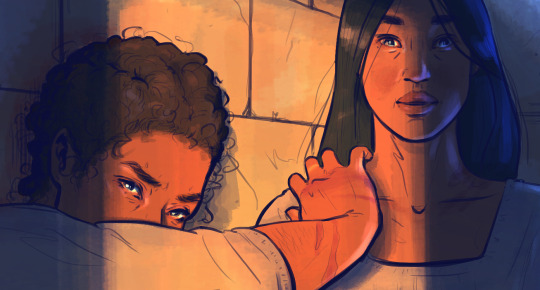
"We can fight, Leane. As long as we are alive, we can fight."
Massive spoiler for The Shadow Rising.
Probably my favourite chapter of the whole series so far, if only because it was one of the most striking and extreme turns, an absolute game-changer. It was also gloriously prepared by the start of the book. I am so excited for what comes next for them.
#Siuan Sanche#Leane Sharif#wot book spoilers#wot fanart#the wheel of time#the shadow rising#show: the wheel of time#character: siuan sanche#character: leane sharif#mandatory essay about how bloody amazing siuan is#I've already talked in my notes about how raw this feels and how incredibly relatable her anger is#I could write an essay about the way you can sense the panic coming in waves to her mind and then she reins the terror in#and I KNOW it's not a word for word translation of the book#particularly when it comes to their attire but there's no way I'm drawing it like that#or that the show keeps it that way#I've forced myself to draw a background too and shade in hatches#I am so happy#is it messy ? yes but it is finished
342 notes
·
View notes
Text


A small collection of Kakashi sketches to fill the void :3
#kakashi#kakashi hatake#naruto fanart#fanart sketch#sketch#My eyes literally burn so bad rn I'm so tired and I'm pulling an all nighter#I could write a 10 page essay about how this man is the peak character#His only character flaw is the books he reads and doing that is actually very ✧uncharacteristic✧ of him
653 notes
·
View notes
Text
as someone who loves to reread books, i feel like the hunger games has some of the best rereadability
i’ve read each of the trilogy each least 5 times each, and tbosas twice, and every time i pick up something new, sometimes about panem as a whole, sometimes it’s character insights, sometimes it’s connections to the real world.
ive said it before, but suzanne such a brilliant author, and she manages to give every character such depth that makes them ALL such compelling characters
i just think it’s incredible how she can write books that fall perfectly into a ya dystopian genre and also provides such profound commentary on society and government
#the hunger games#thg#katniss everdeen#gale hawthorne#peeta mellark#finnick odair#book tumblr#the hunger games might just be my magnum opus#one day i will write down all of my many thoughts and truly there are MANY#i could write an essay on gales character#i used to be his number one hater but recently i’ve been seeing him in such a different light and i think he’s a perfect representation#of young oppressed men and how their oppression can radicalize them#also i am so obsessed with pollux’s character and i want to know everything about his life and how he became an avox his family EVERYTHING#i just want to sit down and talk with suzanne about these books for hours and hours
48 notes
·
View notes
Text
Love Is Stored in the Oatmeal Raisin Cookie
On Lizzie & Ripred

The newest take I’m seeing right now, both in the TUC tags and on my “controversial TUC takes” post, is that Lizzie’s relationship with Ripred is unfounded and that the inclusion of it “robbed” us of a softer moment between Gregor and Ripred. I disagree with this take so much that I decided to write an entire essay about my thoughts on the subject. The most common argument I see against Lizzie is that she received Ripred’s affection, as well as his tragic backstory, after being present for a very short period of time, while Gregor has known Ripred for months. At a surface level, this may seem counterintuitive, but when we dig deeper into the characters and their behaviors, motivations, and allegiances, the thematic significance of Lizzie’s role in the story becomes apparent.
First and foremost, let’s take a look at Gregor. I love this kid so much, but I do believe that the core of this argument hinges on his more subtle flaws as a character. Consider this: the entirety of The Underland Chronicles is narrated from Gregor’s point-of-view. What does this mean for our perception of the story? We receive only the context that Gregor has, and we only receive the details that Gregor notices and finds important. Across the series, his understanding of the Underland and its denizens expands, grows, and solidifies. He is twelve by Code of Claw and very much still learning and growing, but some of beliefs have settled by this point.
This is where Ripred comes in. Gregor has more or less made up his mind about Ripred by the end of Curse of the Warmbloods. He wants to lead the Gnawers and will achieve that goal by any means necessary. He’s an ally, but probably not a friend, grumpy and abrasive and untouchable. Definitely not worthy of sympathy, because he can take care of himself. In short, Gregor doesn’t see Ripred as a multidimensional person, as someone with emotions outside of anger and self-importance.
In direct opposition, we have Lizzie. Upon first glance, she might seem inconsequential until Code of Claw, because her character arc is quiet and mostly happens off-screen. She’s anxious about almost everything, and the Underland puts her through a lot of trauma in the earlier books without having ever set foot down there. It took her dad from her when she was only four years old, and when he returned years later, he was ill and severely traumatized. His absence and then his inability to work meant that she grew up in poverty, spending a large portion of her childhood food insecure and without a stable home life. Similarly, the Underland suddenly took Gregor, who by that point had undertaken a parental role in the household, and Boots away on more than one occasion. These traumas were then compounded on in Curse of the Warmbloods, first when her family’s apartment was swarmed by rats and then when Grace, the stable parent and breadwinner, contracted the plague and was unable to return home.
Lizzie’s role in both Marks of Secret and Code of Claw directly opposes the effect that Gregor—and by direct extension, we as readers—expects this trauma to have on her. Lizzie is afraid of almost everything, and the Underland has harmed her directly in the past. She should approach it with fear, maybe even hostility, like Gregor does in portions of the book. Lizzie is not Gregor, though, and her key trait as a character is that she is able to see the world as a whole through different eyes. So she chooses kindness, instead.
This is where the excerpt above comes in. Lizzie has never met Ripred personally at this point, and she really only knows anything about him from Gregor’s stories—which almost certainly don’t paint Ripred in the kindest light. Lizzie sees beyond the surface of these stories, though, and considers Ripred as an entire person, with depth and emotions. What she sees between the lines is up for individual interpretation. Maybe she latches onto Ripred’s insistence that Gregor learn echolocation, a skill that might save her brother’s life. She does pester Gregor about practicing. Maybe she sees pieces of Gregor reflected in those stories about Ripred. A rager who doesn’t quite fit in where he’s from or where he’s fighting for, who can be stubborn and short-tempered and quick to hide his vulnerabilities from the people he considers himself responsible for. Maybe she sees pieces of herself reflected in those stories. Maybe, as someone who has lost pieces of her family, who has only one friend, who has likely eaten less than her share so that others could be full, she finds it easy to spot the humanity, for lack of a better word, in Ripred, like light through the crack under a locked door.
Whatever her reasons—and maybe there are no reasons beyond “he’s a person, too”—Lizzie goes out of her way to treat Ripred with kindness before she ever meets him. She sends some of her own food with Gregor so that Ripred doesn’t have to go completely hungry. She makes sure Gregor knows to share that plate of oatmeal raisin cookies with Ripred. Where Gregor rarely shows any gratefulness for his help and, in fact, rarely views him through a lens unclouded by a deeply ingrained bias against Gnawers, Lizzie is kind. Ripred notices.
This is not a matter of Ripred suddenly opening up to Lizzie for little reason after bonding with Gregor across the entire series. Ripred treats Lizzie differently because she acted differently. Their relationship is not built only on Lizzie’s similarities to Silksharp, but on a history of compassion and respect. It isn’t shoehorned in, it’s a necessary relationship that supports the central themes of The Underland Chronicles—violence, war, and colonialism are cyclical, but the refusal to continue living life based on the biases of the past can break that cycle and bring about a brighter future for everyone.
#you could say I have some thoughts on the subject idk#yes hello my name is Orion and I did write a thousand word essay on blorbos from my books#one of these days I’m gonna write about Hamnet and just never shut up lmao#formatting on mobile is a bitch and I did not do a solid proofread on this so sorry if something is a lil screwy#the underland chronicles#gregor the overlander
23 notes
·
View notes
Text
im so mad that this is a side blog account and not a main account. i started this blog when i was still relatively new to tumblr and i think i was… like. fourteen years old or something. i never thought i would continue for this long, and i never knew so many people would like the content i put out here (i have over 9k followers which is literally mind-blowing, like wow….).
because this isnt a main account, i cant respond to replies left on my posts, i cant really reply to anyone unless i reblog !! i cant even follow people with this blog, it just comes up as my main blog (which is not pjo-related… rip my failed attempts at organising my fandoms to different blogs). so my avenues of interaction with a lot of you are seriously impeded.
so i just want to say i am so thankful for all of you, i read every single person’s tags who reblog my stuff, i read all of your replies and every time im crying screaming rolling around on the ground in agony over the fact i CANT REPLY!!
i know my posts are super inconsistent these days, im glad so many are still here! i think i may change some of my content eventually (never gonna get rid of the incorrect quote stuff, i’ll just be adding some other things like pjo headcanons or analyses or something), just to spice some stuff up on here.
#also! im currently writing a fantasy book rn and have been so stressed over the fact that authors are expected to have a following before—#—reaching out to agencies with a manuscript. and i seriously stress about creating a following.#so my backup plan is literally you guys. my four year old pjo account on tumblr with its silly little quotes 😭😭#and like. if that works. could you imagine. that you guys may actually save my future ??? like?? i love you guys for just following me bc ??#YOU MAY SAVE ME FROM THE CAPITALIST PRESSURES OF SENSATIONALISING ONES OWN ART FOR INVESTED SUCCESS YAYYYYYY#anyways im not going to promote it now bc its still in the first draft area. not near for me to even go thru revisions yet. i may never-#-promote it on here. i dont want to annoy people with suddenly changing tracks. and i def wont transform this blog into a self promo for me-#-thats never going to happen! i would make another blog for it but for now everything’s just an idea!#i just wanted to say thank you because this has been giving me so much anxiety especially since graduating high school. the problems of—#—trying to be an author have become more pressing and immediate for me. i hope it will happen one day but who knows#you guys give me confidence though. and i literally cannot thank u guys enough (I HATEEEEE THE CAREER ANXIETY)#not riordanverse#not incorrect either#for followers#rewriting#sorry for the whole essay in the tags ☠️
61 notes
·
View notes
Text
I finally finished it!
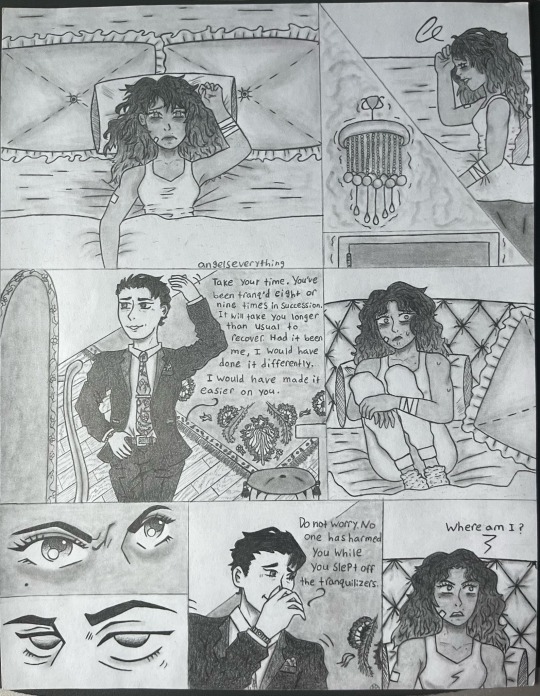
#I feel like I don’t have to say this but the internet is scary NOT A SHIP!!!#would you guys believe me if I told you I started this earlier October#this scene had me sweating bullets 💀#first time posting art since 2020 pls be nice to me#CAN WE TALK ABOUT UNDIVIDED OMGGGG I WAS NOT OK#honestly Risa shouldn’t be scared she could probably fold Divan in half with those shoulders#I could write an essay about how much Divan creeps me out#something about how gentle he tries to act around the children he’s literally harvesting#sorry I’m slow at drawing#unwind#unwind dystology#bookblr#books#divan umarov#risa ward#Risa
23 notes
·
View notes
Text
One thing about me is that I will always defend Edmund Pevensie's terrible decisions in The Lion, the Witch, and the Wardrobe
#I could write an entire essay about that horrible little child#but no one wants to hear a non-christian talk about christianity in an academic way lol#I'm kind of obsessed with CS Lewis' beliefs about sin and forgiveness right now while rereading the books#what a fascinating guy#narnia#edmund pevensie
15 notes
·
View notes
Text
Listen okay I just know in my heart Cecil Palmer and Sydney Sargent would be BEST friends
#camp here and there#ch&t#sydney sargent#cecil palmer#wtnv#LISTEN they would trauma dump together and love each others jokes and be very cryptic about stupid shit#I’d pay big bucks to listen to the two of them chat together on a podcast#and it’d work because ch&t is FOR SURE in whatever parallel universe nv is in#anyways#this just in: camp here and there makes local queer go feral#it is literally everything I want in a podcast#I could write an essay about how I think Sydney and Jedidiah give me the everyday dynamics I’ve been craving for Cecil and Carlos#and I might but that’ll be just for me#but this is the first podcast that’s had be actively taking notes from episode 1 because there’s just so much of a puzzle to piece together#I’m just having so much fun it’s like a book I can’t put down except it’s a podcast#max rambles in the tags
62 notes
·
View notes
Text
Just finished a re-listen of my favourite HTTYD book the mental illness is returning & I am coming back to my base state obsession.
#the way I could write multiple massive essays about the Themes and Concepts of these books#the way I want to so bad#httyd books#not sw#shut up Flynn
25 notes
·
View notes